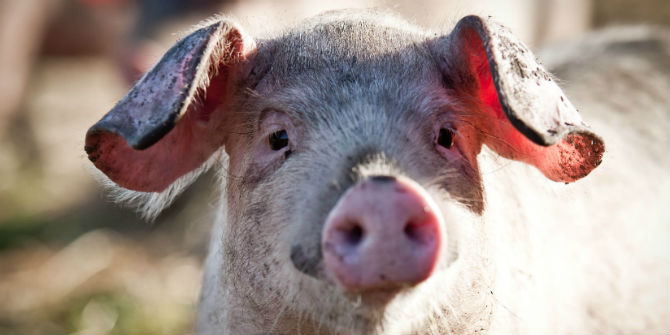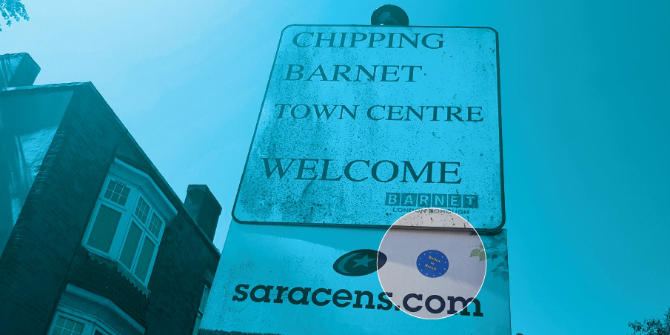 The Common Agricultural Policy is inefficient, and much of British food production is uncompetitive in the absence of tariffs. And free trade deals of the kind the UK plans to pursue outside the Single Market will hurt farmers even more than the loss of subsidies. Dieter Helm says Brexit is a chance to stop subsidising large landowners and spend more on environmental protection.
The Common Agricultural Policy is inefficient, and much of British food production is uncompetitive in the absence of tariffs. And free trade deals of the kind the UK plans to pursue outside the Single Market will hurt farmers even more than the loss of subsidies. Dieter Helm says Brexit is a chance to stop subsidising large landowners and spend more on environmental protection.
A majority of Britain’s farmers voted for Brexit in the referendum. This is perhaps surprising in the context of an industry which receives around £3 billion in subsidies from the Common Agricultural Policy (CAP), and yet comprises only about 0.7% GDP. Of all the vested interests, British farmers have more to lose from Brexit than almost any other industry.
From the public interest perspective, there is much to gain. The CAP pays the bulk of the subsidies as a payment for owning land (called Pillar I). The economic effects of Pillar I subsidies are obvious: increasing the revenues per hectare raises the price of a hectare. Land prices capitalise the subsidies, creating barriers to entry. As a result, the CAP has also now established a fund to help young farmers get into the industry, in the face of the obstacles the CAP itself creates. The rest of the subsidy goes on rural development and environmental schemes (called Pillar II). These are often poorly designed.

It would be hard to make a new British agricultural policy worse than the CAP, short of reverting to the subsidising production directly, which created the notorious wine lakes and butter mountains of the past.
There are several options for reform because of Brexit. Discounting reverting to more of the same, the first option is to shift some of the subsidy from paying to own land towards more spending on the environment – i.e. shifting the balance from Pillar I to Pillar II.
The second is more radical, switching to a system of paying public money for public goods. The second meets the economic efficiency criterion: it would start with identifying the market failures, and then use a combination of taxes and subsidies to address them. The public goods, which the market will not deliver unaided, are mostly environmental, and are concentrated on the small farms mostly, but not exclusively, in the uplands. By happy coincidence it would therefore direct subsidies to poorer and more marginal farmers, rather than large scale producers. This could be tied in with the government’s manifesto commitment to a 25-year environment plan to ensure the next generation inherits a better environment.
The farming lobby resist this more radical option for at least three reasons: they will suffer capital loses on land prices; they will face considerable international competition; and the speed of the change will be disruptive.
On the capital losses, this is a distributional impact, which would fall most heavily on the better off landowners. It is likely in any event that the 2020 reforms of the CAP in Europe will reduce the subsidy to the larger landowners in any event.
Brexit is a once in a generation opportunity to get rid of one of the EU’s most inefficient policies
On the trade issues, these are substantive, but can and should be dealt with independently of the subsidy regime, through tariffs and trade agreements. The sad fact is that almost all of British agriculture is uncompetitive in global markets in the absence of tariffs. This is especially true for sheep and other meat production, even if issue of animal welfare is taken into account. It is for the government to decide whether consumers should pay a premium through tariffs and trade barriers in order that more expensive food is produced in the UK. If, as the government has suggested, it is looking for free trade agreements with the US and others, as well as with the EU after Brexit, the trade consequences for British farmers are likely to be much more detrimental than the loss of the CAP subsidies.
On the disruptive impacts of a sudden withdrawal of Pillar I subsidies in 2020, these arise because of the time horizons in crop choice and farm management. In order to enable farmers to plan their strategy ahead, the government would need to signal now what the post 2020 regime may look like. There is however no evidence that there is any government clarity, let alone decisions, on agriculture policy yet, or indeed that there is going to be soon. Hence the case for transitionary arrangements is considerable. One possibility is to set out a clear framework from 2025 onwards, and taper a transitionary path from 2020 to 2025.
Brexit is a once in a generation opportunity to get rid of one of the most inefficient policies the EEC, and then the EU came up with upon which most of the EU’s money has been spent. There is no obvious case to spend £3 billion, given all the other calls on public expenditure. There is however a strong case for using some of the money freed up on more environmental public benefits. This should be developed as a core part of the over arching 25-year environment plan. Indeed it must be if the 25-year plan is to be delivered, since around 70% of the land is subject to agricultural use.
A remaining puzzle is why the farmers voted for Brexit. It turns out to be one of the rare cases where one of the most effective lobby groups Britain has ever seen voted for the public interest against their private ones. They cannot possibly have believed their subsidies would not be reduced as a result of the choice they made through the ballot box.
This post represents the views of the author and not those of the Brexit blog, nor the LSE. It was first published at the OUP blog.







Why did farmers as a group vote for Brexit when the pundits were saying, and are saying, it was/is against their economic interests.CAP is but a minor issue here.Does anyone remember Mansholt?He did a U-turn on agricultural policies he had been promoting for years because he saw the light, or a different light.Brexit has opened up a can of worms, not only for farmers.A can of worms which was growing more complex by the day.
Initially, CAP was meant to protect smallish farmers.The least economic units would be phased out as the farmers got too old and the next generation could see no future in a smallholding.Germany and Austria are an exception here, because many farmers there are part-time, or hold down a part-time job.However, the system of subsidies and tax law were structured to help create bigger and more efficient units.This was and still is the case.By the time Mansholt started pushing for the family farm of modest size to be supported, the corporate management mentality had taken over.On the continent, farmer lobbies in France and Holland were particularly succesful in getting what they thought they wanted, but corporate control of government nevertheless did make it harder for the smaller operators to maintain a western standard of living, particularly also because corporate business controlled trade and retail.In the UK, as the author here puts the question, how is it that farmers voted against their best economic interests.Well, maybe they did not.They might well have consciously or by accident voted against their landlords and corporate neighbours and the bankers from London who can buy an estate every years out of their bonuses alone.There is much to be teased out over the next decade.Not least the arrangement whereby a farm or farming estate attracts no death duties.This was meant to help young farmers take over the family farm.As per usual, it was an arrangement tailor-made for the rich and corporates to further corporatise or, in my words, neo-feudalise, the agricultural sector.Of course, every economist and other appointed or kept expert on these matters, to date, as in everything else, is pushing the issues towards a globalised corporate neo-feudal state of affairs, with the entire body-politic in the service of international high finance and every politician and their political party back-up operating as corporate stooges.This is as yet most un PC, but this issue will not go away, unless and until the corporate movers and shakers have found a way to make about half the native population in Europe go disappear.What else.
It’s much less complicated. They voted Brexit because Boris Johnson told them they would keep or increase their subsidies. I have read of at least one reported case where a farmer voted leave as a protest against DEFRA delaying CAP payments in the mistaken belief that DEFRA was an EU body.
That is news to me.I do know quite a few farmers went off the EU due to sovereignty or blue(EU) bureaucratic tape issues.I am not aware that red tape for UK farmers is any worse than in Holland or France, quite the contrary, I would have thought.Your comment, Phil, does not sound representative of the rest, or a deciding matter.
I wouldn’t disagree with what you say about red tape. Perhaps my first sentence should have read ” … keep or increase their subsidies and lose the EU ‘red tape’.” The opposite is likely to be true. I wonder how many farmers feel confident they will have “control” subject to the likes of Andrea Leadsom unchecked by any EU oversight. If they are to continue to sell into the Single Market, assuming they avoid crushing tariffs and costly boarder-control delays, they will still need to be in compliance with EU regulations, going forward without any say in how those regulations are made.
A challenging time for the farmers as well as the government.There will be export opportunities outside on the EU and with some crops and products they will have to compete with imports.
Environmental management ought to have a future as additional income.Without turning the countryside into a Disney park, it would be worthwhile turning back on the worst examples of rural slumification, discourage prairie farming and limit factory farming as unfit for the UK(and other highly populated countries, for that matter.Make the UK less dependent on imports.Levy a milage charge on all raw materials and products.
I do remember Mansholt and he was considered a good guy by the newspapers as he would sort out ‘inefficient family farms’. It was said that British farms were much more efficient. Efficiency is not just a matter of money v money out in farming. There are environmental factors and profits derived from exhausting the soil is not efficient.
The danger for farmers with Brexit is that the free market ideologues will be in charge and they have this fantasy about stripping away government subsidy and let the market decide. It is not likely to be good for consumers esp. poor people with a family to feed.
The first thing to say is that the UK was a net contributor to the CAP so we will immediately make a net gain coming out.
Many farmers voted for Brexit firstly due to promises made by the likes of Boris Johnston and secondly because they were getting increasingly fed up with the bureaucracy connected with subsidies and also with the ‘one size fits all’ nature of CAP. In short it was trying to work for 28 different countries each with their own vested interests. Therefore the simply promise of Brexit for farmers is ‘ same money but simpler more relevant policies designed for UK farmers’. This is, of course, attractive to a livestock farmer like myself. However I know that in voting for Brexit, farmers have taken a very big gamble.
The first thing that I would like to see are efficiencies made in the administration of farming support. It is hugely over-bureaucratic with lots of people employed to carry out endless audits which have nothing to do with food production. During this period I would try and keep, as farm as possible, subsidies the same. After that we then need to look at what we are trying to achieve with subsidies. The problem for any rural areas up and down the country is that they are very dependent on agriculture so any significant reduction in subsidies in the short term will lead to speedy rural economic decline. Any reduction in money to agriculture must be done in conjunction with support for diversification out of agriculture. There needs to be a 10-20 yr plan in place and Brexit perhaps gives us the opportunity to do this in a sensible and reasonable way which is tailored to the needs of the UK rural economy with the consent of the UK taxpayer. Here’s hoping…..